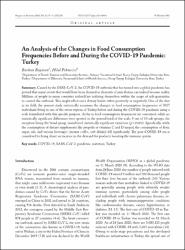An analysis of the changes in food consumption frequencies before and during the COVID-19 pandemic: Turkey
Citation
Basaran, B. & Pekmezci, H. (2021). An Analysis of the Changes in Food Consumption Frequencies Before and During the COVID-19 Pandemic: Turkey. Progress in Nutrition, 23(4), e2021218. https://doi.org/10.23751/pn.v23i4.10431Abstract
Caused by the SARS-CoV-2, the COVID-19 outbreak that has turned into a global pandemic has proved that many events that would have been deemed as elements of pure fiction can indeed become reality. Millions of people in many countries isolated/are isolating themselves within the scope of self-quarantine to control the outbreak. This might affect one's dietary habits either positively or negatively. One of the first in its field, the present study statistically examines the changes in food consumption frequencies of 3017 individuals living in one of the seven regions of Turkey before and during the COVID-19 pandemic using a scale formulated with this specific purpose. As far as food consumption frequencies are concerned, while no statistically significant differences were spotted in the general total of the scale, 9 out of 10 sub-groups, the exception being the bread group, manifested statistically significant variations (p<0.001). Specifically, while the consumption of dietary supplements like propolis or vitamins C and D surged, the consumption of flour, sugar, salt, and various beverages (instant coffee, soft drinks) fell significantly. The post-COVID-19 era is considered to bring about an increase in the demand for products boosting the immune system.


















